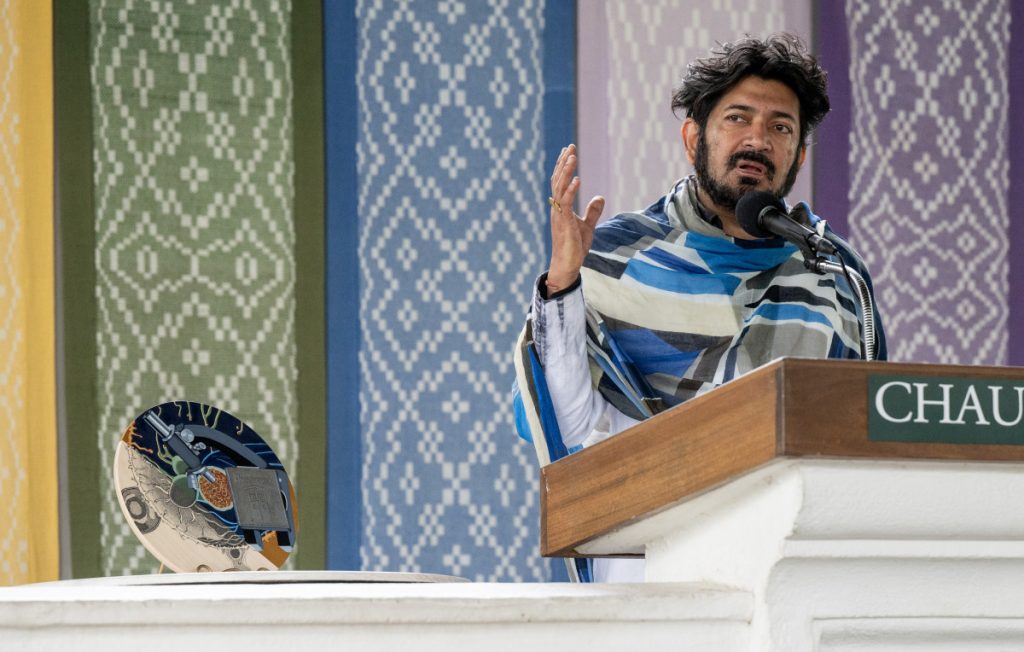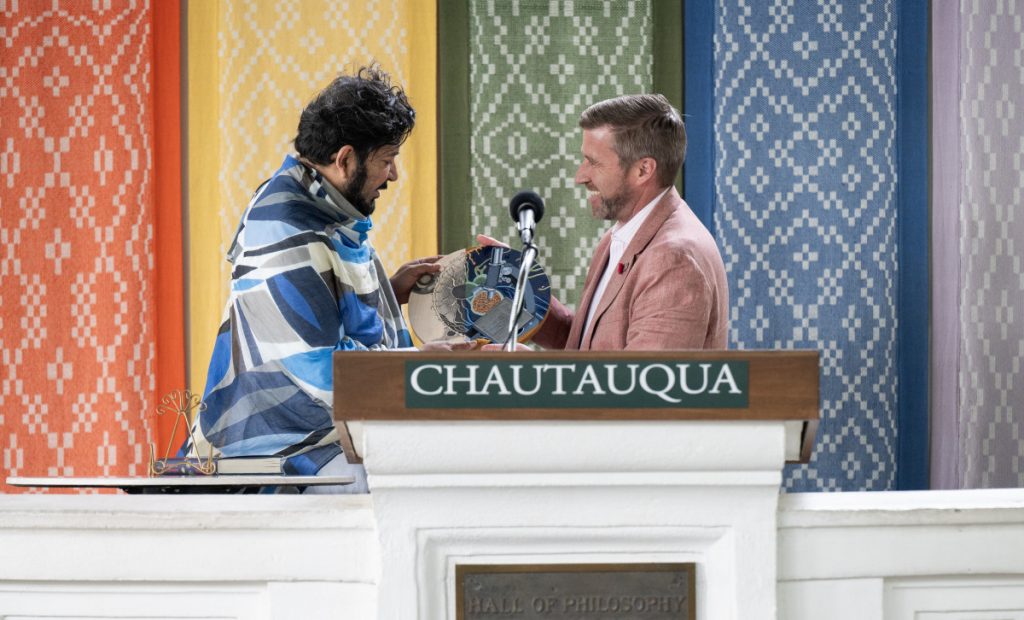
On a rainy Wednesday evening, surrounded by the stately columns of the Hall of Philosophy, Siddhartha Mukherjee was honored with the 2023 Chauauqua Prize for his book, The Song of the Cell: An Exploration of Medicine and the New Human.
Awarded annually since 2012, The Chautauqua Prize is given to a book of fiction or literary nonfiction for creating a significant contribution to the literary arts. All Prize books also count toward Chautauqua Literary and Scientific Circle graduation eligibility.
“We celebrate The Song of the Cell … filled with writing so vivid, lucid (and) suspenseful, the complex science becomes thrilling,” said Deborah Sunya Moore, senior vice president and chief program officer. “The Song of the Cell tells a centuries-long story of how scientists discovered cells, began to understand them and are now using that knowledge to create new humans.”
Told in six parts — each identifying as a cell — the book is laced with Mukherjee’s personal experiences as a researcher, doctor and writer. Both panoramic and intimate, Moore said it’s a masterpiece about what it means to be human.
Since its beginning, the Prize has been inspired and supported by the late Michael I. Rudell and his wife Alice. Rudell imagined the concept, and with the help of the Institution, brought it to life. Along with various other contributions, Rudell is honored by the endowed director of literary arts position, held currently by Sony Ton-Aime.
“(Mukherjee’s) writing is at once academic and accessible,” said Michael E. Hill, president of Chautauqua Institution. “Beyond that, he makes the complex compelling, conveying the hard science of the cellular into grand, almost mythic prose that encompasses the largest questions of philosophy and humanity.”
Mukherjee serves as an associate professor of medicine at Columbia University, cancer physician and researcher, as well as a Rhodes Scholar, with degrees from Stanford University, University of Oxford and Harvard Medical School.
The physical prize is almost always commissioned to a local artist, and bringing The Song of the Cell to life this year was made possible by Jamestown artist Angela Caley. Hill presented the award to Mukherjee before handing over the podium.
Caley grew up in a household where her mother was a “professional sick person” and her stepfather was a family practice physician. Constantly surrounded by medical journals, she said, anatomy and medical imagery has seeped into her art.
“I wanted to show the interconnectedness of human nature and all things through the way of self. … I chose to make the prize under a microscope (and) I think it worked out super great,” Caley said at a private reception Tuesday.
Mukherjee opened his speech Wednesday referencing an article from The New York Times, titled “A Stroke Stole Her Ability to Speak at 30. A.I. is Helping to Restore It Years Later,” that explained how the brain activity of a paralyzed woman is being translated into words spoken by an avatar.
“A device, which uses artificial intelligence, was able to convert her thoughts to speech,” he said, noting he is involved in a project similar to this. “To take people who are dysarthric, who are unable to speak because they have ALS, Lou Gehrig’s disease, our project focuses on that.”

In collaboration with Google A.I., Mukherjee and his colleagues opened a trial with 1,550 patients; he said this is the first time interfaces have been created between cells and machines.
“This is a form of what I would say is the growing interface of cellular physiology — and what we used to call, in the 1950s and ’60s, bionics,” he said. “But really, in contemporary terms, would be called cellular computational interface.”
Mukherjee wrote The Song of the Cell, he said, because there was a lot already written about genes and biology, but not so much about cells, the central unit of any life-form.
“It remains one of the great challenges of biology to create a completely artificial cell from scratch,” he said. “It’s my belief that the first ones are being made right now. In the next 20, 30, 40 years, we will see completely de novo artificial cells being created.”
Once this is done, he said, life will have been created from scratch. Mukherjee proposed a humanistic triangle of limits, to appease scientists while keeping their “progressively lunatic” ideas in check.
“The first, most important element of the triangle is the scientific advancement as it moves into the human sphere,” he said. “I will include that as it moves into the biosphere as well, because we are becoming increasingly conscious that the human sphere and the biosphere are very much more intricately linked.”
The human sphere, he said, attempts to solve a broadly defined problem of suffering. Mukherjee said it’s easier to understand this in the realm of cancer, for example, since there’s continuous medical advances rather than simply existential wonder.
“I make the distinction with this book, in particular, between emancipation and enhancement,” he said. “Emancipation is, of course, the relief of human suffering. The enhancement is the aid directed toward the solution of disease.”
The second part of the triangle, Mukherjee said, is to maximize the risk-benefit analysis to the best capacity.
“In a genetic sense, we would like to use genes to find mechanisms that we think are as directly as possible linked to a disease,” he said. “So, if that’s a generic idea in the cellular biology world, we would like to use cell therapies that are as deeply understood as possible before using them on humans.”
The third part of the triangle is “Does it deviate?” Mukherjee said this includes the realms of understanding, complexity and queries.

“Ask the question, not to scientists, but to a broader community of people who think about these questions,” he said. “Ask the question, ‘Does it really make sense to use a novel technology when that technology has the capacity to deviate, violate (or) return in any matter?’ ”
Mukherjee said thinking about new technologies brings him back to why he wrote The Song of the Cell.
“There were obviously concerns of known and unknown, but I felt as if I was operating within the limits of the triangle,” he said. “These three things were swirling around me as I went around thinking about this book, how to write and what to write about.”
The general wisdom of writing books, he said, is that the story can be told in a linear, chronological manner — Mukherjee’s personal downfall.
“Chronology is not my best friend here, because it would be unreadable,” he said. “As far as the literary crafting of this book was concerned, I chose a completely different kind of strategy, something I’ve never done before. … Every chapter is made up of multiplicities of cells, every chapter will take on the personality of a cell.”
Each chapter, alongside having the personality of a cell, is a micro-history which builds on top of the previous chapter, while simultaneously new.
“You can sense the moment when the book starts speaking back to you, and then it’ll guide you,” Mukherjee said. “Your job as a writer is to listen and listen again, and that respect fosters respect. … In order for the book to be your guide, you have to give it a skeleton structure.”
Once the skeleton is in place, he said, the rest of the book comes to life.




